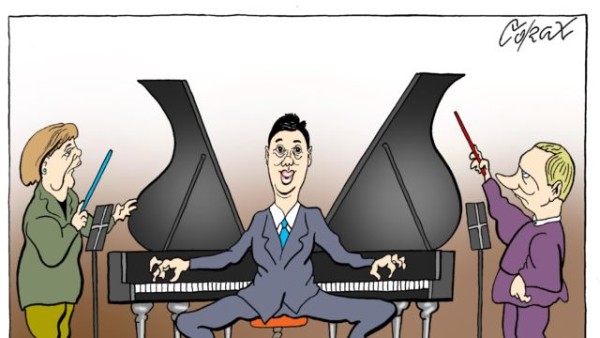How Serbs View Russia And EU

By Gordana Knezevic/
Serbian people, like their political leaders, seem to be in two minds about the world and their place in it. According to a recent poll, 42 percent of young people in Serbia would like to see the Russian political system implemented in their country.
But on the other hand, when asked where they would ideally like to live, 70 percent of those between 18 and 35 chose the United States or Europe. Clearly, there is some confusion here. Is it possible that the average young Serb sees the future of their country as a version of Vladimir Putin’s Russia, while at the same time dreaming about living in the West?
The poll, run by the Belgrade-based Center for Euro-Atlantic Studies (CEAS), concluded that the number of Serbian citizens who have a positive view of Russia is growing. As one Belgrade resident phrased it, “My mind is in Europe, but my heart and soul are in Moscow.”
Renowned historian Latinka Perovic attributes this mind-set to the fact that Serbs do not really know Russia. “They have only a folk image of Russia. Russia is a kind of mirage for Serbia. We want to be part of the EU, but we imagine that we can also maintain good relations with Russia,” she said, adding that Russians and Serbs share a vision of a “great state” that must be preserved at all costs, including by the use of force at home and abroad.
According to analysts, at the heart of this confusion is an unanswered question about the kind of society that most Serbs would like to see — an autocracy with an overbearing state that dominates society, or the democratization of society and the rule of law.
Milivoj Beslin, another historian, believes that the Serbian media’s pro-Russian bias is responsible for the confusion. In a December 2015 interview with the daily Danas, Beslin pointed out that all media outlets, whether government-controlled or run by the opposition, are uniformly pro-Russian. “The interests of the autocratic Russian regime are identified with the Serbian public interest in our media space,” Beslin said.
According to Beslin, this means that certain inconvenient facts are never mentioned in the Serbian media. For instance, that the total of Serbian exports to Kosovo is greater than its exports to Russia. Or that Russia is not among the major donors of foreign aid to Serbia. Or that no nation is required to give up its separate identity and culture to join the EU, while in Russia, minorities have been assimilated and Russified, and languages other than Russian extinguished.
This media uniformity and ideological orthodoxy results in an image of Russia — and its relationship with Serbia — that is almost entirely divorced from reality. For instance, Russia has been willing to offer credit to Serbia and facilitate purchases of Russian military equipment, but it was the EU that provided most of the economic assistance to Serbia in the wake of the devastating 2014 floods.
***
Former Serbian Ambassador to Moscow Jelica Kurjak disagrees and doesn’t think that Russian influence in Serbia is growing. “When you become disappointed in one option [the EU], it is normal for the other one to seem more attractive. Pro-Russian sympathies have never really waned — not even when a larger percentage of people favored EU membership,” Kurjak has said.
“There is a certain segment of the population, 35-50 percent according to various sources, or at least one-third and probably more who are always favorably inclined toward Russia, and expect great things from it. This third or more of the population is just more prominent or vocal.”
If you try to sit on two chairs, you just end up falling into the gap in between. This is how Beslin described Serbia’s foreign policy that aims to strike a balance between the EU and Russia. He maintains that oscillating between these two poles is not good for Serbia:
“One risks losing the trust of both sides. There is a myth about [Yugoslav leader Josip Broz] Tito’s Yugoslavia staking out a similar position ‘between East and West.’ But this is false. In the early 1960s, Yugoslavia was in a deep economic crisis because both markets [Western and Eastern blocs] were closed for its goods. The nonaligned countries were far away, and as trading partners they were insignificant. The key trade partners were the same then as they are now — Italy and Germany.”
To tip the balance, Russia is attempting to peddle influence with a combination of soft and hard power.
The Serbian-based Center for a Civil Society has carried out research into the “soft” Russian influence in Serbia. The NGO calculated that there are currently 40 Internet sites and organizations in Serbia that are promoting Russia and its policies. According to CEAS director Jelena Milic, Serbia is experiencing a perfect storm of Russian interests focused on disrupting processes of democratization and Euro-integration.
At a recent panel in Belgrade, Beslin said that Russian influence in Serbia was going beyond the use of soft power: “The Russian presence is visible in different areas, from the military and intelligence to media, the economy, and religion.”
However, Russia, and its Serbian sympathizers, have been very clever in exploiting cultural affinities between the two countries, and supposedly common goals — such as blocking Kosovo’s path to sovereignty — while obscuring Serbia’s real economic and political priorities, which would mean unequivocally embracing the EU.
Perhaps it is this that explains the paradox revealed by the recent polls. In spite of Russian propaganda, most young Serbs see themselves as citizens of Europe, but at the same time they are enthralled by an idea of a Russia they barely know — an image of a powerful, well-ordered state, naturally inclined toward its smaller Slavic brother. An image projected by the media playing on the hopes and anxieties of its audience.
(“Conductors,” by Predrag Koraksic Corax)